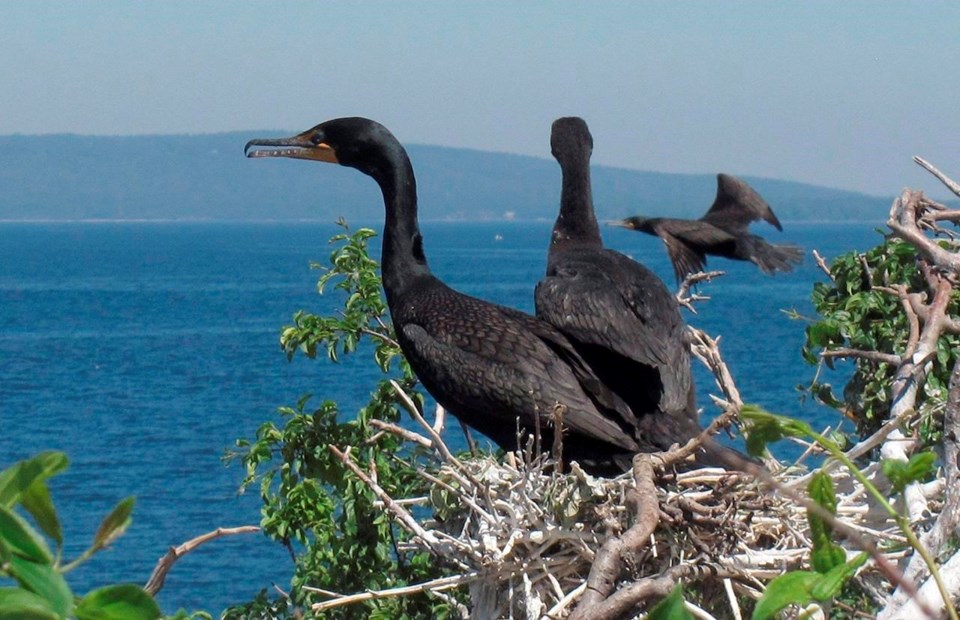SYDNEY, N.S. — It's a battle in the skies — and so far, the bombing cormorants sowing scatological havoc in a Nova Scotia harbour are winning.
For the second year, cormorants have squatted in the Sydney, N.S., harbour for their nesting season. The waterfowl have coated the docks in so much guano this year that officials set up designated stations for people to clean their soiled shoes.
A spokesman for the Crown corporation that operates a ferry service at the harbour said it will form a task force to evict the cormorants, which are strewing droppings and seaweed throughout the terminal and piers.
"The committee will work with the province of Nova Scotia and pest control representatives as we determine potential options to deter the birds from returning next year," said Darryl Mercer with Marine Atlantic.
The creatures, he said, established their nests on light poles at the North City terminal. "It's a traditional area where they have nested, but (last year) was the first time that they actually moved to the light poles at the terminal property."
The birds are a protected species and nests cannot be taken down, he said. "We let them go through the nesting season."
So when the critters took flight at the end of the season last year, the corporation installed spikes on the light poles to make the structures uncomfortable on which to build homes. But the clever cormorants levelled spikes installed on lamp posts where they like to nest with a barrage of seaweed, he said.
"Unfortunately, these birds are very aggressive, but they're also very intelligent," Mercer said with a sigh.
"So what they did for the bird-control spikes is they started dropping seaweed on top of the spikes, and did it continuously until the spikes were bent down and were no longer effective."
The corporation also installed an optical deterrent device called an “eagle eye,” which had the opposite effect: instead of repelling the birds, it attracted them.
"Eagle eye — the way that it spins around, it imitates fire and that's traditionally supposed to scare birds away as well. We thought we had it well in hand," Mercer said.
"The eagle eye … the cormorants actually liked it. For other birds, they would be scared of it, but not the cormorants, they had no issue with it whatsoever."
Paul Carrigan, interim chief executive for the Port of Sydney Development Corporation, said the newly built Liberty Pier is also an attraction for the cormorants. Although he said they seem to frequent it only during the day.
That could be because a security guard drives along the nearly 100-metre dock in his vehicle all night long, Carrigan said.
The port employs two people for about eight hours during the day to use pressure washers to clean the dock of droppings.
"We don't want to be paying for a security guard every night from now until whenever so we will purchase something that will hopefully provide us with a deterrent," he said. "And we don't want to clean it all the time."
He said he had only just finished placing an order for four seven-metre-long inflatable air dancers — like the ones used by car dealerships — to ward off the birds.
"One of our employees said that we should get Halloween-themed ones, and it was funny."
The authorities have also planned to get a device, used by the oil industry, that emits a sound to deter birds, he said.
"We're looking at our options and we're going to try to find the best option."
Mercer said he knows the birds will return to their nesting place and hopes the task force can come up with some viable solution.
"We're just going to move them down the coastline, a couple of miles to some nice cliffs where we'd love to see them succeed, and then have wonderful families for many, many years to come," he said. "We just prefer it wasn't on our terminal property."
This report by The Canadian Press was first published Sept. 21, 2023.
— By Hina Alam in Fredericton.
The Canadian Press




